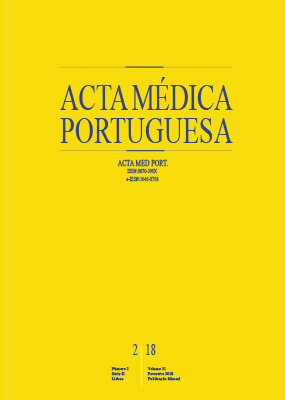Smoking Cessation after Bladder Cancer Diagnosis
DOI:
https://doi.org/10.20344/amp.9106Keywords:
Smoking, Smoking Cessation, Urinary Bladder NeoplasmsAbstract
Introduction: Smoking is an important risk factor for the development, recurrence and progression of bladder cancer. Our aim was to analyze smoking habits after diagnosis in bladder cancer patients. Additionally, we evaluated patient knowledge about smoking as a risk factor and the urologist role in promoting abstinence.
Material and Methods: A cross-sectional, observational and descriptive study was performed in bladder cancer patients, diagnosed between January 2013 and September 2015 (n = 160) in Braga Hospital, in Portugal.
Results: Smoking history was present in 71.9% of the sample, with 21.9% current smokers, (40.7% of abstinence after diagnosis). Smoking was acknowledged as a risk factor by 74.4% of the sample, with only 51.3% of ever smokers and 24.4% of non-smokers recognizing smoking as the leading risk factor (p = 0.008). The presence of other household smokers were significantly higher in patients who continued smoking (40%) than in ex-smokers after diagnosis (4.2%) (p = 0.005). The majority of smokers at diagnosis (83.1%) were advised to quit by their urologist, but only one smoker (1.7%) was offered any specific intervention to aid in cessation.
Discussion: Smoking is not recognized as the leading risk factor for bladder cancer. This limited awareness, associated with the known difficulties in quitting smoking and the observed lack of smoking cessation interventions, may account for the high current smoking prevalence, albeit in line with other studies.
Conclusion: This study highlights the need for efficient smoking cessation programs directed to bladder cancer patients.
Downloads
Downloads
Published
How to Cite
Issue
Section
License
All the articles published in the AMP are open access and comply with the requirements of funding agencies or academic institutions. The AMP is governed by the terms of the Creative Commons ‘Attribution – Non-Commercial Use - (CC-BY-NC)’ license, regarding the use by third parties.
It is the author’s responsibility to obtain approval for the reproduction of figures, tables, etc. from other publications.
Upon acceptance of an article for publication, the authors will be asked to complete the ICMJE “Copyright Liability and Copyright Sharing Statement “(http://www.actamedicaportuguesa.com/info/AMP-NormasPublicacao.pdf) and the “Declaration of Potential Conflicts of Interest” (http:// www.icmje.org/conflicts-of-interest). An e-mail will be sent to the corresponding author to acknowledge receipt of the manuscript.
After publication, the authors are authorised to make their articles available in repositories of their institutions of origin, as long as they always mention where they were published and according to the Creative Commons license.









